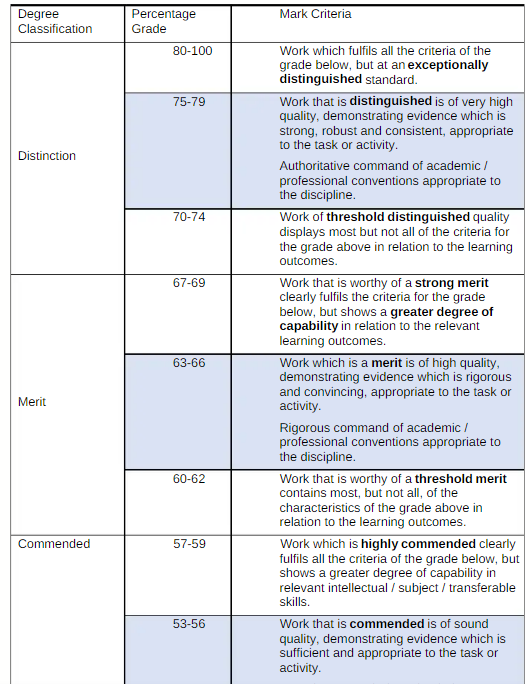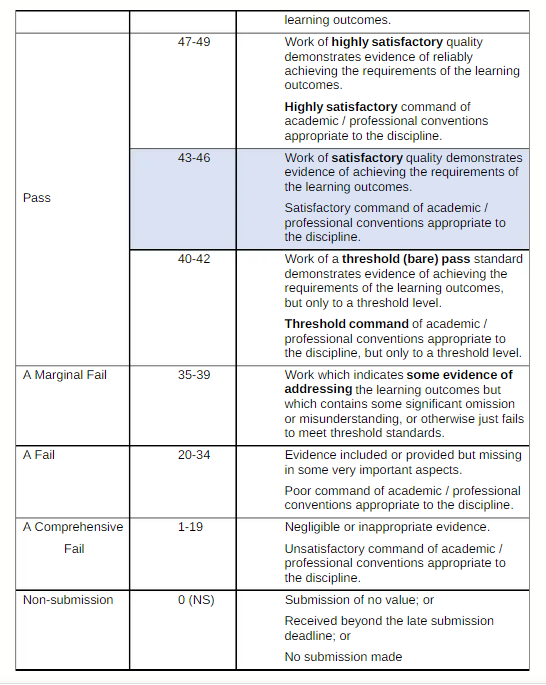| Deadline date: |
23 May 2025 |
Assignment: |
A1-size scientific poster |
| Return date: |
23 June 2025 |
Assignment: |
AS2 |
ENV4101 The Poster
Part of the assessment for ENV4101 dissertation is production of an A1-size scientific poster suitable for presentation at a conference. It is worth 15% of the overall module credit.
The poster is a 'snapshot' of your project at the time (mid/late June), i.e.
- part updated proposal, e.g. what has changed since the proposal, changes to aims and objectives,
- part preliminary/interim results and discussion,
- part anticipated/expected results and implications thereof,
- part provisional/interim conclusions,
- part what is left to do,
- possibly, what you would do differently if doing the same/similar again.
Note that:
- the exact balance depends on the individual person and project,
- there is much variation in the status of the projects at the time of the snapshots.
Remember that this is before the final submission deadline and it is likely that you will still have ongoing research and will have not fully written up. Therefore, all you can present is a 'snapshot' of your project at that time. You are not expected to present a finished project but you are expected to make a concise and coherent presentation of the progress you have made in relation to the aims and objectives in the proposal.
Notes/advisories regarding Turnitin submission
- The submission of the poster is via Tumitin (via NILE), so please bear in mind that NILE / Turnitin has a maximum uploadable file-size of ca. 20 MB. Consult your supervisor or the module tutor if your final file size is greater than the Turnitin limit or if you otherwise experience difficulties in submitting your poster.
- You are strongly advised to submit your poster as a PDF to avoid / minimise potential submission problems, e.g. corruption of text formatting styles, mis-location of figures.
Module Learning Outcomes of ENV4101:
On successful completion of the module, with limited guidance students will be able to:
Subject-Specific Knowledge, Understanding & Application
- Execute research involving primary data collection OR undertake a critical analysis of secondary data OR critically evaluate alternative methodological and/or philosophical theories, in the area of the subject.
- Locate the topic of investigation in its theoretical context with reference to appropriate literature, including formulation of a research proposal evaluation of risk and ethical implications.
- Locate materials, documents and information sources and liaise effectively with relevant outside bodies/individuals appropriate to honours degree level.
- Critically analyse and evaluate, synthesise and discuss the research in a logical and systematic manner in the context of current knowledge and understanding of the topic.
Employability & Changemaker Skills
- Design and manage a project plan to meet identified aims and objectives, justify methods show an ability to anticipate and respond proactively to problems that might arise, drawing on relevant literature.
- Articulate core ideas and concepts to tutors and supervisors and to a wider audience such as, but not restructed to, scientists, line-managers, research commissioners, public meetings.
ENV4101 Assessment and Grading Criteria


General Advice for ENV Assignments
- You may find it helpful to read through the whole assignment before starting to answer the first question.
- You should certainly read through the whole assignment before starting to answer any part of it.
- Note the wording of assignment, in particular the action verbs and ensure that you answer the question asked and not the one that you think should have been asked!
- ENV are science modules; hence your answers should be scientific in tone.
- Where required, present arguments that are logical and contain statements which are supported by scientific information expressed in the correct scientific terminology.
- Your tutor will not look favourably on over-generalised discursive writing that fails to address the points at issue.
- For most written answers, credit will be given for the overall 'quality' of the writing - for clarity, structure and appropriate style - as well as for the content.
Presentation of the Assignment.
- You should use A4 paper/page-size.
- Present answers in clear English with a good standard of grammar.
- When answering questions requiring calculations and data presentation, remember to:
- present your answer clearly;
- include all steps in a calculation;
- use SI units;
- give your answers to an appropriate number of significant figures;
- give all graphs, tables and diagrams a title;
- clearly label axes on graphs.
- It is essential that all work that is not your own is referenced (see below).
- The Study-Skills Guide details an acceptable method of referencing (Harvard).
- Where reference is made to legislation, guidelines and principles, state the full name and date.
ENV4101 Submission of Assignment.
- Submit one copy electronically via the ENV4101 NILE site.
- Assignments submitted after the Deadline will be capped according to University regulations and guidelines. See the Course Guide for details.
Referencing.
- All texts should be referenced using the Harvard System. An on-line referencing tutorial is available at: http://library.northampton.ac.uk and follow the links for 'Referencing'.
- Cite academic journals, textbooks and govemment-reports in preference to web-pages. Assignments which are poorly referenced and/or overuse of web-only sources of information, particularly uncorroborated ones, will be penalised.


